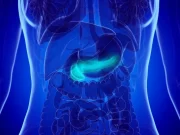Tag: Cancer: Pancreatic
AI Tool Can Identify Pancreatic Cancer on CT Scans
Deep learning-based tool distinguished between malignancy, controls with 74.7 percent sensitivity for malignancies smaller than 2 cm
Radiomics-Based AI Models Can Detect PDAC From Prediagnostic CT
AI-based approach may detect pancreatic ductal adenocarcinoma at a subclinical stage
Neoadjuvant mFOLFIRINOX Studied for Borderline Resectable PDAC
For patients with borderline resectable pancreatic ductal adenocarcinoma, favorable overall survival seen with eight cycles of mFOLFIRINOX
Surveillance of High-Risk Group May Downstage Pancreatic Cancer
For patients with screen-detected PDAC, median survival was 9.8 years versus 1.5 for those with PDAC detected outside of surveillance
DDW: Gallstone Disease May Predict Pancreatic Cancer Incidence
Gallstone presentation may be a missed opportunity for earlier diagnosis
AI Tool May Help Predict Risk for Pancreatic Ductal Adenocarcinoma
Model uses features in computed tomography scans of the abdomen to help identify those at high risk for developing PDAC
Black Seniors With GI Malignancy More Likely to Be Frail
Black patients also more likely to report limitations in daily living, instrumental activities of daily living
Eligibility Criteria Add to Race Gap in Pancreatic Cancer Clinical Trials
Black patients disproportionately excluded from participation in pancreatic cancer clinical trials
Fecal Microbiota-Based Screening Feasible for Pancreatic Cancer
Fecal metagenomics classifiers better than salivary-based classifiers for identifying pancreatic ductal adenocarcinoma
HTN Meds Tied to Lower Mortality After Pancreatic Cancer Diagnosis
Mortality risk reduced for patients exposed to ARBs after PC diagnosis and for those exposed to ACE inhibitors in first three years













